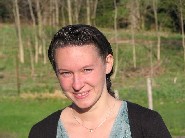
Jennifer Mendell
2005
- 2006 CSIP Fellow
Research
Interest:
Microbiology
I am a fourth year PhD candidate in the Department of
Microbiology. My research focuses on a group of amazing
bacteria that belong to the genus Epulopiscium. These
intestinal symbionts of certain species of herbivorous
surgeonfish are unusual in several ways. First, unlike
a typical bacterium, such as E. coli, which reproduces
through the process of binary fission, Epulopiscium has
developed a novel mode of cellular propagation –
the production of internal vegetative daughter cells.
Another unusual characteristic of Epulopiscium is the
amount of DNA found in Epulopiscium cells. On average
an individual Epulopiscium cell contains 150 picograms
of DNA! This is approximately 33,000 times the amount
of DNA that comprises a chromosome from E. coli and 25
times the amount of DNA found in a human diploid cell!
Finally, some types of Epulopiscium can reach lengths
in excess of 0.6 mm and can easily be seen with the unaided
eye! My research focuses on identifying cellular modifications
which allow Epulopiscium to maintain such a large cell
size.
Because the cells are so large, and Epulopiscium is non-pathogenic
it can easily be brought into the classroom and serve
as a model for studying basic concepts in microbiology,
as well as helping to dispel the myth that bacteria are
“primitive” or “simple bags of enzymes”.
Microorganisms drive the biogeochemical cycles on our
planet. I would like to develop an inquiry-based module
that uses the symbiotic relationship of Epulopiscium and
its herbivorous surgeonfish host to demonstrate the importance
of these cycles in the maintenance of a healthy planet.
Surgeonfish are keystone species on many tropical reefs.
These fish graze on algae and it is believed that the
Epulopiscium help the fish digest this complex vegetative
matter. It has been demonstrated that in areas where the
surgeonfish are over-harvested coral reef health is compromised.
The algal overgrowth shades the coral leading to death
of its photosynthetic symbiont and eventually to death
of the coral. In addition to learning about the importance
in biogeochemical cycling, students would gain an understanding
of symbiosis, as well as an appreciation of the coral
reef community, a very cool ecosystem!
As a CSIP Fellow I hope to build strong ties with educators
in the community, learning from them the art of teaching
and sharing with them my knowledge of microbiology. With
a strong background in general biology, microbiology and
anatomy and physiology I would feel comfortable in many
different classroom settings and am more than willing
to assist the teacher in any way I can, from developing
new modules, updating previously existing modules or simply
lending another set of hands. But for me the most important
thing is to motivate and inspire students to learn science
by asking, investigating, creating, discussing and reflecting!

